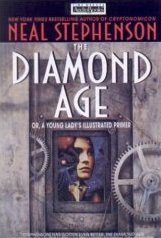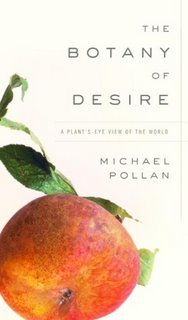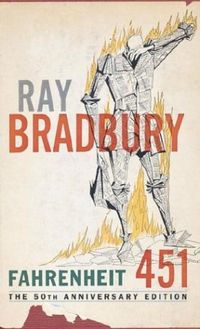
This book is an ambitious look at what happens to the world in the near-future (no more than 200 years hence), when nano-technology has been developed to the point that people get their clothes, furniture, and even food from matter-compilers in their houses or on the street. I must say that after reading this, the David Marusek book I reviewed earlier (Counting Heads) seems very derivative, because he borrowed a lot of concepts from Stephenson. He also seems to have picked up a lot of the same flaws. For example, I said:
It's more like a subset of completely different stories are told as part of an intertwining narrative, but instead of everything coming together at the end in a way you might understand, it just falls apart again after people and events swirl briefly around each other near the very end.
This is pretty much true of The Diamond Age as well. You get characters introduced who disappear completely halfway through, (or in the case of Bud, starts at the beginning and ends at the beginning), or who come in later for no apparent reason and then do not play a major role. One of the two principle characters of this book is John Hackworth, who comes in early, disappears for a long time, and then reappears later only to go away again without having made any contribution that necessitated writing his story at all. He was important; don't get me wrong on that. It's just he was important in the way that the President is important to you or me. We don't need to write exactly what he's doing at this moment to write a story about what his laws are doing to school districts in Texas.
Still, The Diamond Age does have a coherent story that was quite intriguing. The main problem with it was that it didn't conclude. I don't know about you, but I hate that. The book ends, so the story should end. It's like drawing a picture of an elephant, but only putting half an elephant on the page. You didn't finish! That's just annoying to me. It was well written though; Stephenson proved that he's a solid writer to my satisfaction. He had a few Gene Wolfe moments though, so have your dictionary on hand.
The story is basically about what happens to a little girl from a broken home when she runs away with her Young Lady's Illustrated Primer (a book which is actually a very complex nano-machine). The Primer teaches her all kinds of lessons, not just how to survive, but how to succeed and win. That was good, but I was expecting her then to succeed in some major way. By the end, she's still hardly important at all, and when the climax comes, it's like all that was just a sort of prequel to the real story of Nell, but then the book ends. So disappointing.
A lot of the story was a showcase for the various techno ideas that Stephenson could come up with, and I think for the most part they were pretty brilliant. A lot of people think nano-tech and then think of a few things you could do with them, but fail to explore the deep implications such a novel and important technology have on society and individuals. I mean, look at what air travel and computers did for the world. Nanotech will do the same, and Stephenson is trying to scry the future and predict some of what it will look like. Of course I have no way of knowing if he's right, but it's still pretty cool.
His writing is more what you call serviceable than poetic. I mean, he can handle the language, it's just not the main reason to read this book. Look Homeward, Angel, it is not. I usually am of the opinion that sci-fi is a fine read for anybody and the only reason people don't read it is because they are biased and think it is for geeks. However in this case, I might agree that this is more for the geek than the lover of good literature. Again, there's a good story hidden in this book, it's just that for a lot of people, the sci-fi is going to be a lot of stuff they don't understand wrapped in ok but sometimes overly dense writing in which is hidden a great story with some characters you can really care for. I'm just not sure this one will work for the masses. But hey, if you like sci-fi or if you're always willing to give a book a chance, I say read it.

